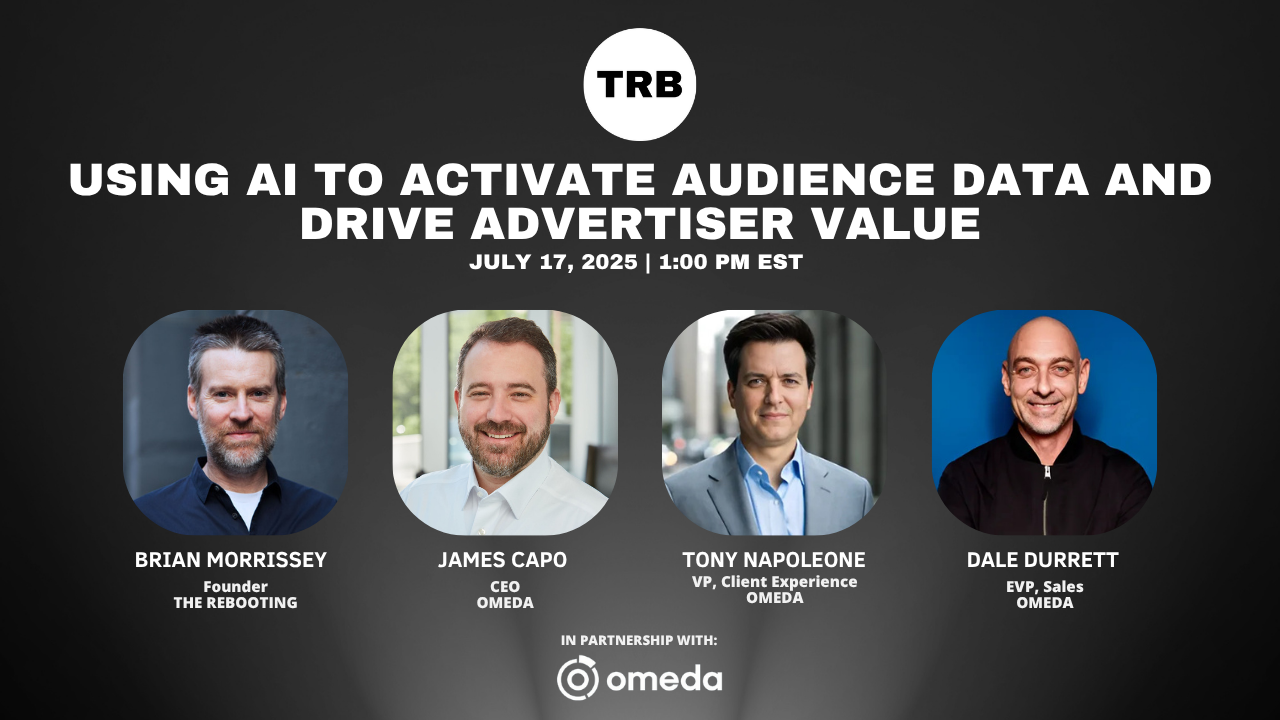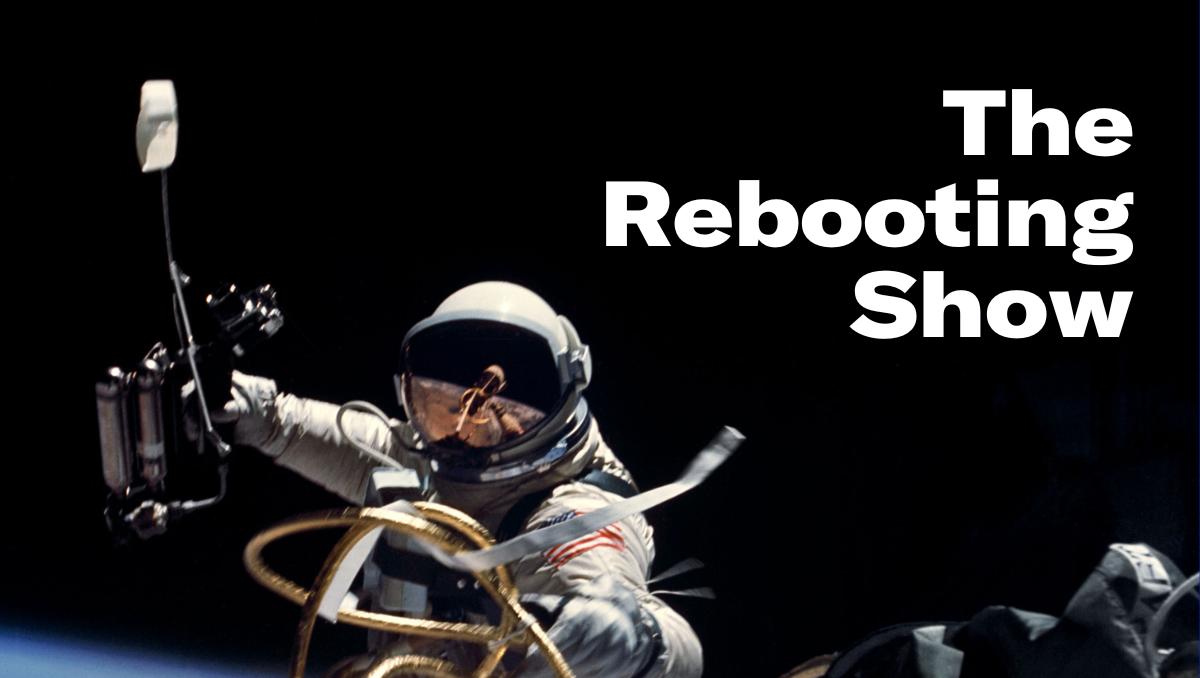Hitting the red button
"Enough is enough"

Today, publishers are finally taking concerted action to fight back against the existential threats they face from AI breaking the fundamental economic bargain of the internet. Also: a conversation with ProRata’s Annelies Jansen on what a new economic bargain for publishers looks like. Finally, we are holding an online forum with our partners at Omeda on July 17 about how their new Sidekick AI tool allows publishers to translate audience data into action.
First, a message from ArcXP.

Reinventing news with AI: Inside Arc XP's vision

AI isn’t a passing trend. It’s an accelerant that will force the reinvention of every media business. On July 17 at 12PM ET, join Joey Marburger and Joe Croney from Arc XP and The Washington Post for a behind-the-scenes look at their bold new AI vision, built for the realities of modern journalism. From native vector search to agentic workflows, see how advancements in AI empower media companies to break free from Big Tech, personalize at scale, and lead through disruption.
This isn’t a sales pitch—it’s a call to action for leaders ready to evolve with purpose and courage.
Hitting the red button
The red button wasn’t very impressive. Even Cloudflare CEO Matthew Prince allowed for that. He was surrounded by publishing executives on the 88th floor at Cloudflare’s World Trade Center offices at midnight, symbolically marking a “new era to the internet” with a New Years Eve-style countdown. This was to mark the moment publishers began to fight back by blocking AI bots. The choice of a red button was fitting; it typically signifies alarm and emergency in industrial design.
That new era is the AI era, which really kicked off in October 2023 with the debut of ChatGPT. That was the beginning of the end of the old internet, which was premised on an imperfect value exchange between publishers and search engines. The bargain was publishers would allow their pages to be crawled and snippets scraped in exchange for traffic. It was an unofficial opt-out system, where a publisher could signal to bots to skip pages. The trade worked.
That bargain began to break down after ChatGPT showed the new era of the internet would mean AI providing answers and ultimately taking actions. No more clicking blue links. Google had no choice to follow suit — you can argue about whether it could have responded differently — since ChatGPT, aligned at the time with Microsoft, was presenting the most credible alternative to its search hegemony that is possibly the greatest economic engine ever created. Inevitably in completion that involves restarting nuclear reactors and cutting $100 million signing bonuses to AI whiz kids, publishers were relegated to a familiar role: collateral damage.
To be clear, AI is an acceleration and culmination of years of Google keeping more traffic on Google or its affiliated properties. The entire premise of the link has been downgraded by tech platforms as a relic of the past. Walled gardens are more lucrative. Don’t be evil was a useful slogan until it became inconvenient. More friction to be eliminated.
Prince watched all of this with alarm. As the CEO of Cloudflare, a top content delivery network, he has a dog in this fight. Cloudflare is not a household name but plays a critical role as essential infrastructure for the open web. He saw the bot data and the math made clear the fundamental economic bargain of the open web was broken. Without a new bargain, publishing content on websites would be an uneconomic activity.
I see this up close, as I too have a far smaller dog in this fight. My business is primarily connecting tech companies to prospective publishing customers. What I’ve seen over the past year is many software companies downgrading their publisher-focused efforts. Ad tech companies have moved on to retail media, digital out of home and streaming. One recently told me it was pulling out of the publishing and media category altogether. I understand. How do you go to your board with a target to grow from a customer base of companies deemed in terminal decline? This is a vicious cycle. Publishers are not tech companies and will struggle even more as software companies skip the category altogether. It’s hard to do more with less without specialized software.
Dotdash Meredith is an example of a successful and very profitable large publisher — and, as Troy has pointed out on PvA, the market assigns basically no value to the asset. That is a judgment on the future of publishing. It does no good to pretend otherwise. It makes sense to hit the red button.
For the last several months, Prince has been vocal about the need for publishers to fight back. He attended the PvA holiday extravaganza in December and delivered this message. He’s made the case to top publishers that this system of one-off deals for a small number of publishers is fundamentally unworkable in a decentralized network like the open web. A systemic solution was needed, and conveniently Cloudflare could provide one.
The red button symbolized the simple solution: turn the internet off for bots by default. The truth is there is no silver bullet for the perilous position of publishing, always downstream from tech giants that have a consistent track record of muscling their way through any change they want. Publishers are often seen as an ungrateful group, particularly news publishers that didn’t play nice even after tech companies gave out welfare payments in the form of PR initiatives disguised as support for news.
Cloudflare has gotten broad support among publishers, which to be fair cannot organize themselves to take collective action because of antitrust law. (It would be sensible to have an exemption from that, by the way. These tech companies are not typical companies but more like utilities.) The optimistic take is this is the start of publishers grabbing leverage over the AI companies that need fresh data. As Dotdash Meredith CEO Neil Vogel told me, without leverage the talk of marketplaces and deals is irrelevant. The truly optimistic take is this new leverage will lead to AI companies lining up to make deals. Sure, Perplexity might not be a noticeably worse product today — it already took all the content — but maybe its investors see access to fresh and reliable content as a competitive advantage. There’s a school of thought that AI models become commoditized, so having access to content others do not provides advantage.
In this view, a marketplace arises that will compensate publishers from the many companies crawling their content. It would in effect allow publishers to levy tarrifs on use of their IP — and in the most optimistic scenario, control over how it is used and presented.
That optimism runs up against the raw power politics of tech. The goofy guys in hoodies were always sharp-elbowed operators who outcompeted others with a degree of ruthlessness that was obscured by manicured and gauzy PR. These companies didn’t think twice about ignoring robots.txt, the generally agreed opt out from crawling. Publishers have been left in the familiar position of complaining how unfair it all is while mostly being ignored.
The biggest leverage to be exerted comes in the form of laws and regulations. Neither are likely. The Big Beautiful Bill goes out of its way to protect AI companies from state AI regulations. Big Tech can always turn to Sinophobia if they’re pressed. Lina Khan is in the private sector, even if her warnings about Big Tech have rare resonance across the political spectrum. And the courts appear to buy the fair-use argument based on the recent Anthropic case.
Nobody is coming to save publishing, certainly not Sam Altman, the latest edition in a line of shifty characters with dubious ethics that Silicon Valley has consistently produced off an assembly line. One attendee gave him the half-hearted compliment of “at least he’s good at eye contact.” The Perplexity Guy is no different. Peter Thiel struggles to answer whether he’s the antichrist and wants humanity to continue. These are not civic-minded allies. When someone shows you who they are, believe them.
Few publishers expect some kind of game changer. They have memories. I used to run a gif on articles about tech platforms and publishers that showed Charlie Brown’s futile attempts to kick the football Lucy was holding, only to pull away at the last moment to send Charlie flying through the air to land in a heap. Even Charlie eventually caught onto Lucy’s game. One exec at the celebration said they expected this to drag on for possibly years and even in a scenario where a grand bargain gets struck, publishers will need to go through a brutal period. This action will also signal to the restive workforces at publishers that their leaders are fighting. That’s important. It isn’t hyperbole to describe this as an existential threat, and dealing with civil wars with unions is going to make getting to the other side impossible. Even the houses in GoT put aside their differences when the Whitewalkers got frisky.
Will it work? Anonymous Banker was unsparing in our PvA WhatsApp: “meaningless.” I think at the very least this is useful PR. These AI companies are at risk of overplaying their hands. This is a tech that is arriving with a cloud of dread by people who fear their livelihoods will be eradicated by a small cabal of oddballs in pursuit of even more power than they already have. Sorry you got stuffed in a locker in high school, but pump the brakes on pushing us to merge with computers because you read too much sci-fi.
We hear more about eradicating jobs than curing cancer. It’s hardly an inspiring message. Parents see their new college grad kids unable to get entry-level jobs and worry they will not have a shot at flourishing. The negative reaction to Jeff Bezos and Lauren Sanchez’s $50 million on a garish wedding is a tell. Note to the oligarchs and their obsequious courtiers: Keep promoting Mamdani’s extreme positions. You might find a Streisand effect because many will agree with him that we shouldn’t have billionaires. FAFO.
Prince is an interesting, unlikely ally. He’s not a celebrity tech billionaire, but he’s someone who can email Tim@Apple. He has juice no publishing CEO has. I presume billionaires are just as tribal as any other group. And unlike other tech titans, he has incentives to get a deal for publishers and seems to me refreshingly genuine in his principled stance. In his brief speech before the red button was pushed, Prince extolled the importance of publishing. He even flew back from vacation in Croatia for the occasion. He claimed that the AI companies are herd animals and want to do deals, recognizing “the fuel that makes their engines work is your content,” only they don’t want to go first and weaken themselves in this massive scramble to accrue power and wealth.
“Enough is enough,” Prince said. “We need to take back control over our content, take back control over what it is that we are giving to the web.”

Using AI to activate audience data

Join us for a live interactive session on July 17 at 1pmET on using AI to turn audience data into action. Learn how Omeda helps media teams uncover insights, launch campaigns, and drive revenue through integrated workflows across email, subscriptions, and advertising. See how smarter data activation leads to better business outcomes. Sign up now.
An AI grand bargain for publishers

What’s a grand bargain look like? I wanted to talk to one of the companies that’s in pursuit of this. ProRata is a company founded by Bill Gross, a giant in the history of the internet for pioneering the paid search model at Overture. With ProRata, Gross is courting publishers to establish leverage by divining the provenance of what publisher content has been used to create AI answers. The next step: build a marketplace.
On the latest episode of The Rebooting Show, I spoke to Annelies Jansen, chief business officer at ProRata, about its approach to attribution as infrastructure, why retroactive compensation is unlikely, and how publishers can regain leverage by working collectively.
Thanks for reading. Send me note with feedback by hitting reply.
For sponsorship information, check out our partnerships opportunities and get in touch with me at bmorrissey@therebooting.com.


